SEARCH BY TITLE
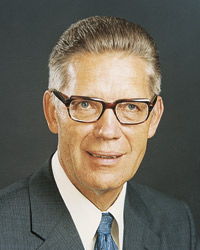 The Caravan Moves On
The Caravan Moves On
This is our goal and aim and purpose in life. Everything we do should please the Lord and further our strivings for salvation. And, the Lord be praised, there comes a time in the lives of faithful Saints when, having kept the faith and been true and faithful at all hazards, the Lord says to them: Thou shalt be exalted. These, then, are a few of the many tests of true discipleship. Now, I have what every true disciple has. It is called the testimony of Jesus. In our day it includes the revealed knowledge that the earthly kingdom—The Church of Jesus Christ of Latter-day Saints—will triumph. In this connection may I set before you this illustration: The Church is like a great caravan—organized, prepared, following an appointed course, with its captains of tens and captains of hundreds all in place. What does it matter if a few barking dogs snap at the heels of the weary travelers? Or that predators claim those few who fall by the way? The caravan moves on. Is there a ravine to cross, a miry mud hole to pull through, a steep grade to climb? So be it. The oxen are strong and the teamsters wise. The caravan moves on. Are there storms that rage along the way, floods that wash away the bridges, deserts to cross, and rivers to ford? Such is life in this fallen sphere. The caravan moves on. Ahead is the celestial city, the eternal Zion of our God, where all who maintain their position in the caravan shall find food and drink and rest. Thank God that the caravan moves on!
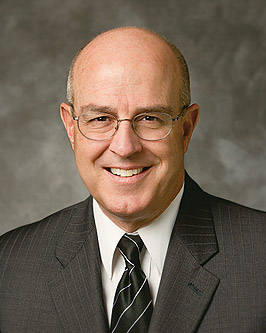 Choose to Believe
Choose to Believe
Just as Sailor had to believe that she would find safety in that distant light, so we too must choose to open our hearts to the divine reality of the Savior—to His eternal light and His healing mercy. Prophets across the ages have encouraged us and even implored us to believe in Christ. Their exhortations reflect a fundamental fact: God does not force us to believe. Instead He invites us to believe by sending living prophets and apostles to teach us, by providing scriptures, and by beckoning to us through His Spirit. We are the ones who must choose to embrace those spiritual invitations, electing to see with inward eyes the spiritual light with which He calls us. The decision to believe is the most important choice we ever make. It shapes all our other decisions. God does not compel us to believe any more than He compels us to keep any commandments, despite His perfect desire to bless us. Yet His call to us to believe in Him—to exercise that particle of faith and to give place for His words—remains in effect today. As the Savior said, “I bear record that the Father commandeth all men, everywhere, to repent and believe in me.” Belief and testimony and faith are not passive principles. They do not just happen to us. Belief is something we choose—we hope for it, we work for it, and we sacrifice for it. We will not accidentally come to believe in the Savior and His gospel any more than we will accidentally pray or pay tithing. We actively choose to believe, just like we choose to keep other commandments.
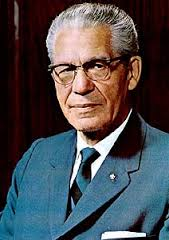 For They Loved the Praise of Man More Than the Praise of God
For They Loved the Praise of Man More Than the Praise of God
One young boy on the school ground can wield a mighty influence for good. One young man on the football team, or the campus, or among his fellow workers can, by living the gospel, honoring his priesthood, and taking a stand for the right, do untold good. Often you will experience much criticism and ridicule even by those who believe as you do, even though they may respect you for doing right. But remember that the Savior himself was tormented, ridiculed, spat upon, and finally crucified because he would not waver in his conviction. Have you ever stopped to think what would have happened had he weakened and said, “Oh, what’s the use?” and abandoned his mission? Do we want to be quitters, or do we want to be valiant servants in spite of all the opposition and evil in the world? Let us have the courage to stand up and be counted as true, devoted followers of Christ. Someone said to me the other day, “Why is it that people who know what they should do and seem to have a testimony of the gospel are not prepared to live it and haven’t the courage and strength to stand up against opposition?” My reply was, “There are many reasons, it seems to me, that cause people to favor and to do things which are contrary to their teachings and contrary to their beliefs.” Then I referred him to two or three scriptures.
 I Know It. I Live It. I Love It.
I Know It. I Live It. I Love It.
The first part of the statement is a self-assured, unapologetic declaration: “I’m a Mormon.” Just as the young woman I met in the grocery store was not afraid to let the world know she was a member of The Church of Jesus Christ of Latter-day Saints, I hope we will never be afraid or reluctant to acknowledge, “I’m a Mormon.” . . . The next part of the statement affirms, “I know it.” In today’s world, there are a multitude of activities, subjects, and interests vying for every minute of our attention. With so many distractions, do we have the strength, discipline, and commitment to remain focused on what matters most? Are we as well versed in gospel truths as we are in our studies, careers, hobbies, sports, or our texts and tweets? Do we actively seek to find answers to our questions by feasting on the scriptures and the teachings of the prophets? Do we seek the confirmation of the Spirit? The importance of gaining knowledge is an eternal principle. The Prophet Joseph Smith “loved knowledge for its righteous power.” He said: “Knowledge is necessary to life and godliness. … Hear, all ye brethren, this grand key: knowledge is the power of God unto salvation.” All truth and knowledge is important, but amidst the constant distractions of our daily lives, we must especially pay attention to increasing our gospel knowledge so we can understand how to apply gospel principles to our lives. As our gospel knowledge increases, we will begin to feel confident in our testimonies and be able to state, “I know it.” Next is the statement, “I live it.” The scriptures teach that we must be “doers of the word, and not hearers only.” We live the gospel and become “doers of the word” by exercising faith, being obedient, lovingly serving others, and following our Savior’s example. We act with integrity and do what we know is right “at all times and in all things, and in all places” no matter who may or may not be watching.
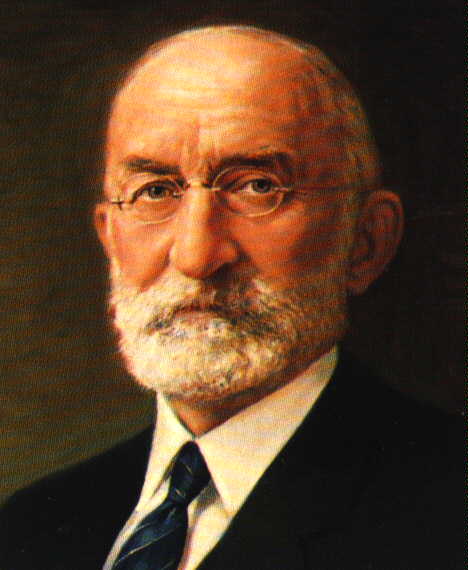 Progress Depends on Obedience
Progress Depends on Obedience
I have met many young men who have said to me, “I do not know that the Gospel is true. I believe it, but I do not know it.” I have invariably replied to them that our Lord and Master has said that he who will do the will of the Father shall know of the doctrine, whether it be of God, or whether he spoke of himself, and if they would do the will of the Father, they should eventually have a knowledge of the Gospel. Some of them have said: “Oh, if I could only see an angel; if I could only hear speaking in tongues; if I could only see some great manifestation, then I would believe.” I wish to say to all within the sound of my voice that the seeing of angels and great manifestations do not make great men in the Church and kingdom of God. Think of the three witnesses to the Book of Mormon. What is their testimony? It is that an angel showed them the plates, and that they knew they had been translated by the. gift and power of God. How did they claim to know this? Because “His voice hath declared it unto us.” What else did they testify? “And we declare with words of soberness, that an angel of God came down from heaven, and he brought and laid before our eyes, that we beheld and saw the plates, and the engravings thereon; and we know that it is by the grace of God, the Father, and our Lord Jesus Christ, that we beheld and bear record that these things are true; and it is marvelous in our eyes, nevertheless the voice of the Lord commanded us that we should bear record of it; wherefore to be obedient unto the commandments of God, we bear testimony of these things.” Yet these men fell by the wayside, though they remained true and steadfast to their testimony to the Book of Mormon.
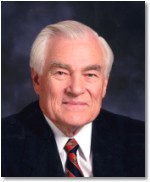 Ten Ideas to Increase Your Spirituality
Ten Ideas to Increase Your Spirituality
The Lord is pleased with us when we “open our mouths” and share with others the conviction we have of the truths of the restored gospel. Among the most important functions of the Holy Ghost are to testify of the Father and the Son and to be a guide to truth. When we are bearing testimony of truth, the power of the Holy Ghost confirms that truth within our hearts. Even if others don’t choose to accept our testimonies of the truth, we are nevertheless helped spiritually. That is one of the reasons missionaries grow so much spiritually while they are on their missions. We are commanded to open our mouths and share our testimonies with others.
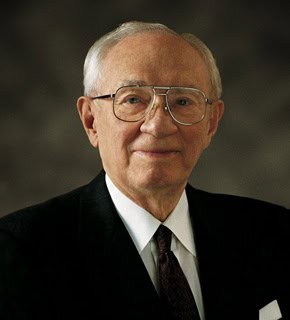 The True Strength of the Church
The True Strength of the Church
When an individual has that witness and testimony, the requirements of the Church become challenges rather than burdens. Declared the Savior: “… my yoke is easy, and my burden is light.” The yoke of Church responsibility, the burden of Church leadership become opportunities rather than problems to him who wears the mantle of dedicated membership in the church of Jesus Christ. While attending a conference in the East the other day, I listened to the experience of an engineer who joined the Church some months ago. The missionaries had called at his home, and his wife had invited them in. She had eagerly responded to their message, while he felt himself being pulled in against his will. One evening she indicated that she wished to be baptized. He flew into a fit of anger. Didn’t she know what this meant? This would mean time. This would mean the payment of tithing. This would mean giving up their friends. This would mean no more smoking. He threw on his coat, walked out into the night, slamming the door behind him. He walked the streets, swearing at his wife, swearing at the missionaries, swearing at himself for ever permitting them to teach them. As he grew tired, his anger cooled, and a spirit of prayer somehow came into his heart. He prayed as he walked. He pleaded with God for an answer to his questions. And then an impression, clear and unequivocal, came almost as if a voice had spoken with words that said, “It’s true.” “It’s true,” he said to himself again and again. “It’s true.” A peace came into his heart. As he walked toward home, the restrictions, the demands, the requirements over which he had been so incensed began to appear as opportunities. When he opened the door, he found his wife had been on her knees. Then, before the congregation to whom he told this, he spoke of the gladness that had come into their lives. Tithing was not a problem. The sharing of their substance with God who had given them everything seemed little enough. Time for service was not a problem. This required only a little careful budgeting of the hours of the week. Responsibility was not a problem. Out of it came growth and a new outlook on life. And then this man of intellect and training, this engineer accustomed to dealing with the facts of the physical world in which we live, bore solemn testimony with moistened eyes of the miracle that had come into his life.
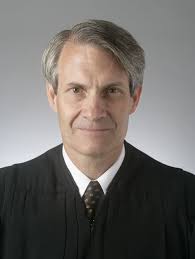 The Very Root of Christian Doctrine
The Very Root of Christian Doctrine
Joseph Smith said: The fundamental principles of our religion are the testimony of the Apostles and Prophets, concerning Jesus Christ, that He died, was buried, and rose again the third day, and ascended into heaven; and all other things which pertain to our religion are only appendages to it. In the temple recommend interview, we are asked, “Do you have a testimony of the Atonement of Christ and of His role as Savior and Redeemer?” In my experience as a bishop and a stake president, I can happily report that I have never had anyone answer that question other than yes; yet I have long had a concern that we don’t fully appreciate that question. I think it significant that of the many roles of Christ, we are asked about only two: His role as Savior and His role as Redeemer. There must be something about these roles that is particularly important to the temple—a place where He binds us to Himself through covenants. Like all stake presidents, I worried about the members of the stake. I worried about the things one might expect a priesthood leader of single adults to worry about, but I also worried about whether the members of the stake had “a testimony of the Atonement of Christ and of His role as Savior and Redeemer.” I had the sense that most of them loved Christ—no small thing—but I worried that not enough of them knew Him as their Savior (one who had saved them) or their Redeemer (one who had bought them). While thinking about this one day, I was reading my favorite chapter in the Book of Mormon—3 Nephi 11—and I noticed some things I never had before. Many have commented that the visit of the Risen Lord Jesus Christ to the Book of Mormon people was a foreshadowing of His Second Coming. As we pay careful attention to what the Book of Mormon tells us about that experience, we can learn valuable lessons as we prepare for Christ’s return. These people were the righteous remnant, those who had heeded the warnings of the prophets. They were prepared to meet the Lord. The story of that encounter is dramatic and moving and has profound implications for each of us.
